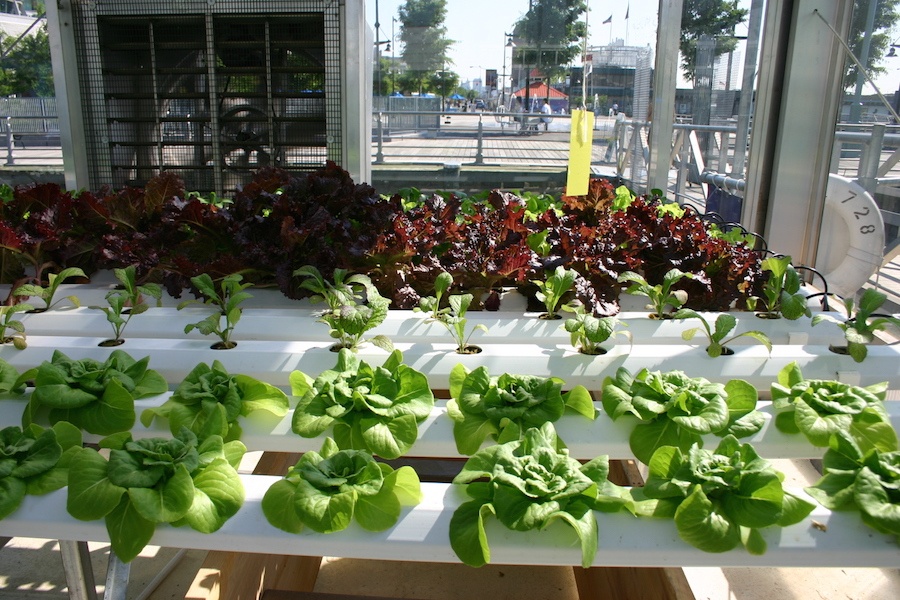Agritech sprouts among Lebanon’s startups

In the mountains of Broummana above Beirut, an entrepreneur is growing vegetables through his hydroponics invention that he hopes will eventually serve the needs of Lebanon and beyond.
“We’re turning into a country that produces stuff and not just consumes stuff,” said Ali Makhzoum, as he talked excitedly about his business-to-business invention that grows fruits and vegetables through a vertical water contraption, using both hardware and software. The technology eliminates the need for soil and pesticides, and grows organic produce using a small fraction of the water normally used, and at a much lower price than most organic food.
“Old farmers are dying out. There’s a lot of work and not a lot of money. I’m eliminating the middleman,” said Makhzoum. “I’m a poor man’s son. It means a lot to me that there are people who can’t afford [organic food].”
Through his company Life Labs, he hopes to reinvent the way people grow and consume food, allowing farmers real-time updates of their produce through online updates, and eventually giving consumers the chance to pick their vegetables right from the vine.
Agriculture probably isn’t the first thing that comes to mind when thinking about entrepreneurship. But some experts see innovation as key to giving farmers in Lebanon and the rest of the Middle East the boost they need to survive in this new age of agricultural challenges – desertification, population explosion, increasing production costs, and decreasing support for traditional and family farming.
Agrytech innovation hub
This is all part of the impetus for Agrytech, a Beirut-based agri-innovation hub that includes an accelerator and a resources platform. The hub was launched in January by the incubator Berytech and in coordination with the Netherlands embassy in Lebanon.
‘What we want to prove is that technology goes across all sectors,” said Ramy Boujawdeh, deputy general manager at Berytech. Boujawdeh envisions this program as just the beginning of agricultural innovation throughout the region, particularly in Syria and Iraq, where the agricultural sectors have been devastated by conflict, but have vast swaths of fertile land.
“When we look at something as important as food security, it’s important to look at innovating the [agriculture] sector,” Boujawdeh said.
The accelerator “aims to advance innovative ideas in the agri-food sector into successful businesses with a global impact.” New farming innovations could include: ecommerce, traceability, payments, big data, artificial intelligence, sensors, IoT (internet of things), internet, mobile payments, drones and logistics.
Starting this year, 30 startups will have the chance to build a basic product over two months. Half of those will then get chosen for a four-month acceleration program to develop their product. Eight finalists will be chosen to take part in a six-month incubation program, giving them the support to take their company global and get investment for scaling.
Agritech initiatives across the country
In addition to Makhzoum’s Life Labs, several other Lebanese companies have already decided to apply for the program, whose funding lasts for two years.
At the American University of Beirut a group of professors are developing a machine through their company E2 (engineer and educate) that separates cucumbers by size for pickling companies, a delicate process that involves sorting out different sizes and shapes of these vegetables that can be easily damaged if not handled properly.
Meanwhile, Riego, an irrigation system developed by Antoine Skayem, using both hardware and software, aims to reduce agricultural water consumption, which currently accounts for more than 80 percent of water use in most countries.
“I saw a market opportunity,” he said. “We need to optimize every resource.”
He initially developed it for a client and then saw that it could meet a larger need, starting with Lebanon and the rest of the Mediterranean basin, eventually serving drought-prone California.
“Lebanon can be a springboard for the rest of the Middle East,” said Roger van Hoesel, an adviser for Berytech’s agritech program and director of Food Valley, an agricultural innovation company based in the Netherlands, whose largest industry is food products.
“I hope that Lebanese businesses will get convinced of the importance of agricultural business,” he said. “I hope it doesn’t stop after just two years.”
Feature image via Wikimedia Commons.


